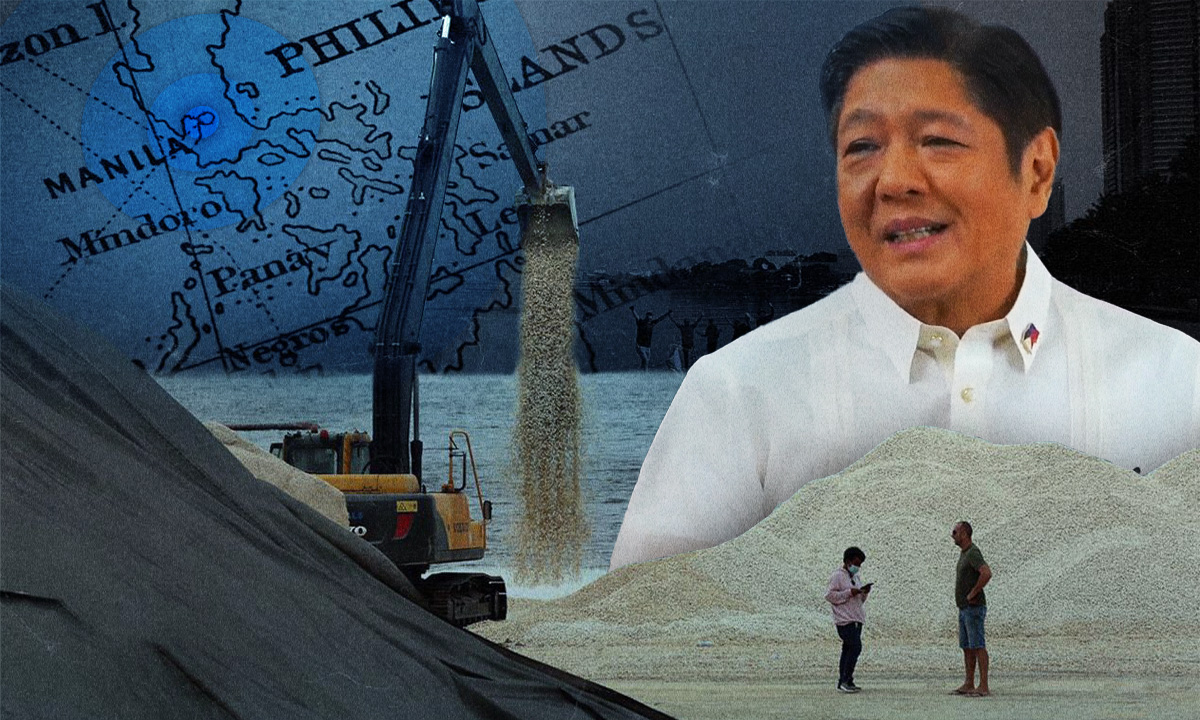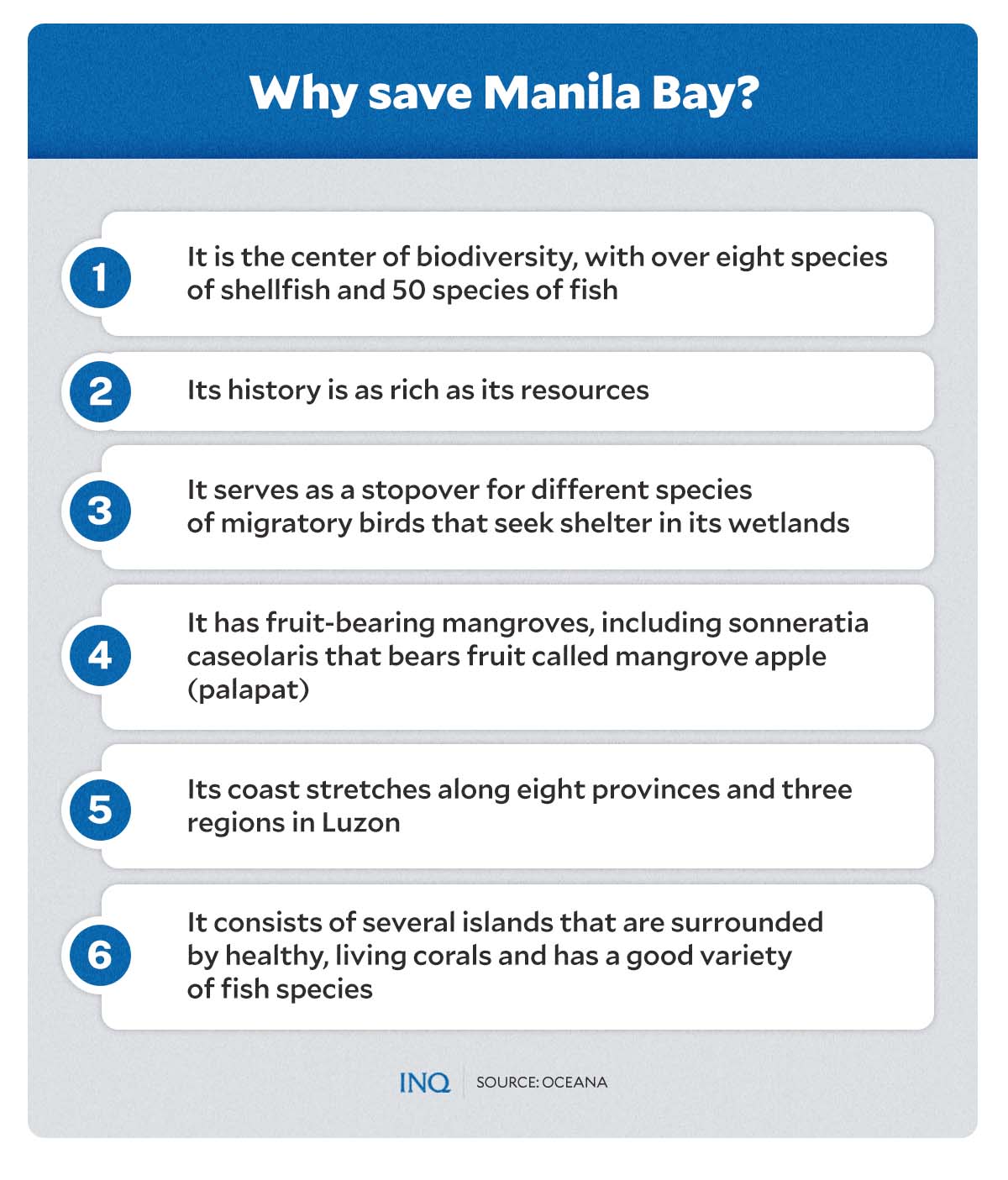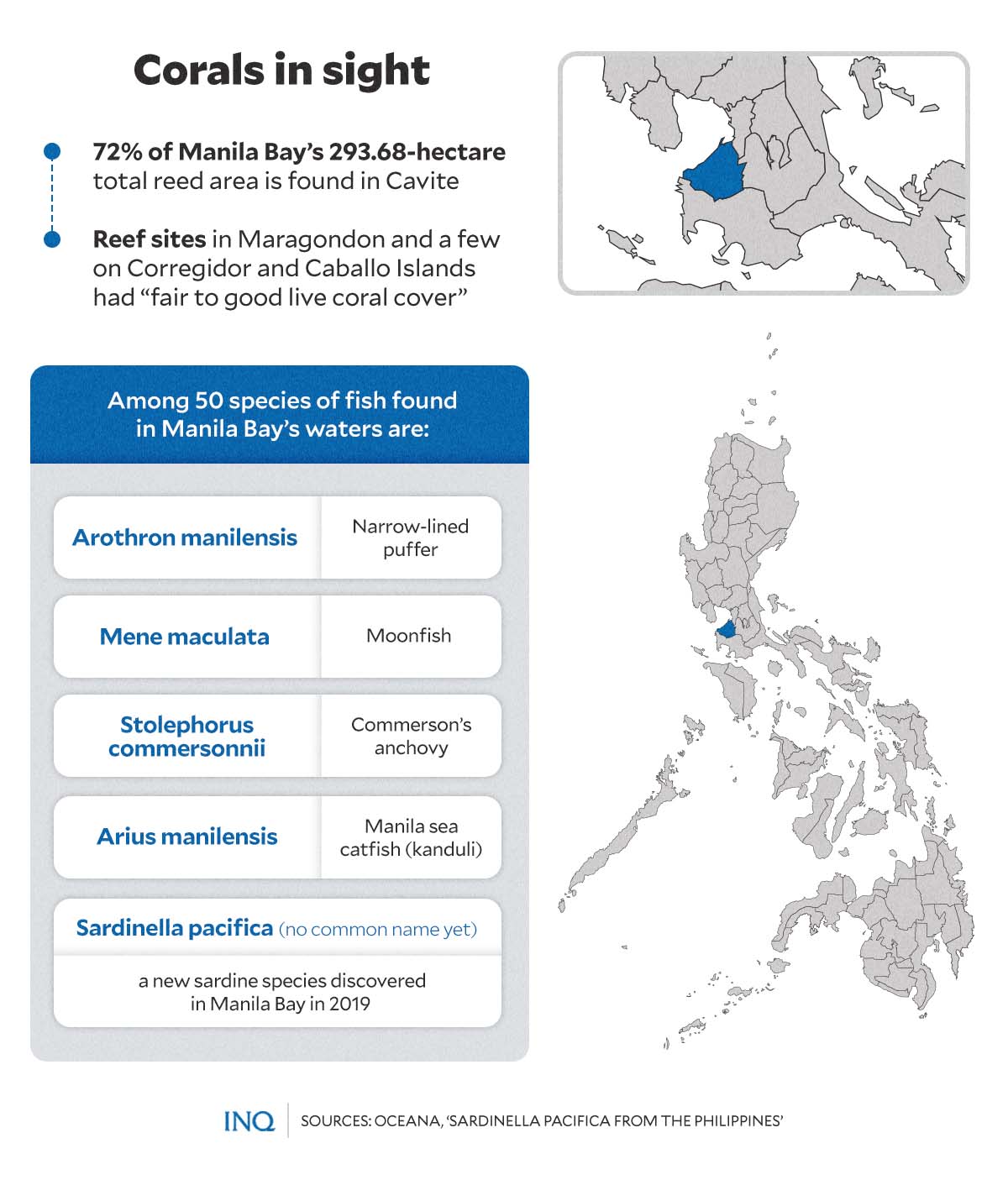‘Resounding victory’ for people: Manila Bay reclamation halt hailed
MANILA, Philippines—Various groups welcomed President Ferdinand “Bongbong” Marcos Jr.’s recent decision to suspend all but one reclamation project in Manila Bay, describing it as a resounding victory for coastal ecosystems and the Filipino people.
Over a month after the Department of Environment and Natural Resources (DENR) announced the start of a review of reclamation projects in Manila Bay, and after the alarming absence of any mention of these projects in the President’s second State of the Nation address (Sona), Marcos finally decided to step in and make a statement on the issue.
Amid the ongoing cumulative impact assessment of the DENR, Marcos said the government has suspended all reclamation projects in Manila Bay, except for one. He also noted the issues in the implementation of these projects.
“They’re all suspended. All reclamation [projects] are under review. Only one proceeded because it has already been reviewed,” said the President at a meeting with officials of Bulacan province.
“There are many problems. We saw many [of the projects] which are not being conducted properly,” Marcos Jr. said after the Bulacan officials aired concerns over the reclamation projects.
Article continues after this advertisement“But anyway, that is another big problem that needs to be fixed. Because if they all push through, many rivers will be clogged, including the ones emptying into [Manila Bay]. The water will have nowhere to go. Even on Roxas Boulevard, the sea will disappear,” he said.
Article continues after this advertisementREAD: Manila Bay reclamation works suspended amid US concern, floods
In a statement, the Advocates of Science and Technology for the People (Agham) welcomed the President’s pronouncement, calling it a victory made possible by the collective efforts of various groups and organizations.
“We welcome the decision to suspend all reclamation projects in Manila Bay. This victory was achieved through the collective action of various civil society organizations who have tirelessly campaigned against reclamation for years,” said Jerwin Baure, public information officer of Agham.
The People’s Network for the Integrity of Coastal Habitats and Ecosystems (People’s NICHE) and Kalikasan People’s Network for the Environment (Kalikasan PNE) echoed the sentiments, stressing that years of work sustained demands to stop reclamation projects in Manila Bay.
“For years, civil society groups, communities, and academic experts have clamored against reclamation in the bay given its clear negative environmental and social impacts,” People’s NICHE, an alliance of marine and coastal protection advocates, said.
“In relation to this clamor, we have also recently seen other government and non-government institutions express concern about these reclamation projects, such as investigations into the projects at the House of Representatives and Senate level, as well as the recent statement from the Embassy of the United States,” it added.
READ: Ongoing reclamation projects in Manila Bay draw mixxed reactions from senators
READ: US Embassy: Manila Bay reclamation projects harm environment, commerce
People’s NICHE said it considered the recent development a “huge step in the right direction towards the genuine restoration and rehabilitation of Manila Bay.”
“In these past few months, civil society groups, grassroots organizations, and academic experts have pushed back against the reclamation developments in Manila Bay, citing the immense ecological and social impacts,” said Kalikasan PNE.
“[T]he Filipino people have scored a resounding victory with this recent declaration. This is another prime example of how collective action, from community activities to national-level dialogues, can push policy in the right direction for the protection of people and planet,” it added.
Exempted project
While his announcement received positive reactions from various environmental groups and civil society organizations, Marcos did not name which projects have been suspended. It was also not clear which project was exempted from the suspension order.
People’s NICHE and Agham urged the government to be transparent and identify which project was exempted and on what grounds it was let off the hook.
“Marcos mentioned that this project already underwent review by the government, but the public still needs to know how the review was done,” said Baure
“Additionally, some reclamation projects like the New Manila International Airport are not listed under the Philippine Reclamation Authority, so its possible inclusion in the list of suspended reclamation projects should be clarified,” he added.
The People’s NICHE added that it is unclear whether the moratorium covers only projects that are legally considered as reclamation projects such as those on the list of the Philippine Reclamation Authority (PRA), or if it also includes projects that go through reclamation-related processes in their construction.
Data from the Philippine Reclamation Authority showed that 22 reclamation projects in Manila Bay are at various stages of development. Half of these have already been issued permits and are already underway.
Among these is the New Manila International Airport in Bulacan, which various environmental and conservation groups have strongly criticized due to its negative environmental impact.
In a television interview hours before the President delivered his second Sona, Transport Secretary Jaime Bautista said San Miguel Corp.’s (SMC) Bulacan airport is about 70 to 75 percent complete and may be partly operational by the end of Marcos Jr.’s administration.
“We believe that the moratorium should encompass the latter as significant projects such as the New Manila International Airport are exempt from the PRA list, and these projects should also be suspended pending a thorough investigation,” said People’s NICHE.
Oceana, an international environmental group, expressed concerns about the exempted project.
“We are […] alarmed by the exemption of one project that was not divulged in [Marcos Jr.’s] statement. This project should be revealed to the public so that civil society groups, fisherfolk, science and academe, and other key stakeholders can validate the reported review that merited its exemption,” said lawyer Gloria Estenzo Ramos, Oceana vice president.
The organization said the reclamation projects were approved despite the fact that Manila Bay has been identified as a Key Biodiversity Area by the DENR and other groups.
Over eight species of shellfish and 50 species of fish can be found deep in the bay’s waters. Among these wide varieties of fish species include the Sardinella pacifica, a new species discovered in Manila Bay in 2019.
READ: Manila Bay not dead, but reclamation killing it, say groups
Aside from being identified as a spawning area of sardines, Oceana added that Manila Bay also serves as an important habitat for millions of migratory birds from the northern hemisphere.
Permanently stop projects, involve communities
As a precautionary measure, groups also pushed the government to extend the moratorium to all reclamation projects across the country pending investigation. This will ensure that affected areas are protected against potential cumulative and long-term social and environmental impacts of the reclamation activities.
READ: Gov’t urged to stop reclamation, quarrying in Manila Bay
“We welcome President Marcos Jr.’s wisdom-filled decision in stepping in and suspending the reclamation projects in Manila Bay,” said Ramos.
“However, we urge the President to permanently stop these projects as they put in peril food security, violate our constitutional rights to a healthy, balanced, safe, and resilient environment and the rights of artisanal fisherfolk and coastal communities to access their fishing grounds and livelihood,” Ramos said.
“We call on the government to immediately take measures to permanently stop these projects that have started, as we speak, that led to an alarming degradation of the environment destroying the mangroves, denying fisherfolk of their fishing livelihood and sources of food, and the destruction of seagrass and the seabed by dredging, thus impeding better habitats and spawning grounds of fisheries resources,” Ramos added.
“This is simply unjust and unacceptable,” she said.
Various groups likewise urged the government to be clear on how the moratorium will be enforced on the ground and prevent companies from operating illegally.
Fisherfolk alliance Pambansang Lakas ng Kilusang Mamamalakaya ng Pilipinas (Pamalakaya) demanded that accountability should come in the form of just compensation for fisherfolk who have lost their livelihood and the rehabilitation of marine resources and coastal communities.
“It is not enough to suspend [the reclamation] projects. Companies that caused the destruction of fish spawning grounds and forced displacement of fisherfolk should also be held liable,” said Pamalakaya Vice Chairperson Ronnel Arambulo.
“For example, the over 300 families of fisherfolk who were forcibly displaced in Bacoor, Cavity due to reclamation should be [allowed to] return,” he added.
To highlight the devastating impacts of the reclamation projects on the coastal ecosystems and communities, Kalikasan PNE emphasized that the administration should include civil society organizations and community representatives in the planned cumulative impact assessment process of the DENR.
“[W]e must discuss how communities that have already been negatively affected by reclamation projects and related dredging operations — the impacts of which range from livelihood loss to worse flooding — will be compensated by project proponents for the damage already done,” the group said.



